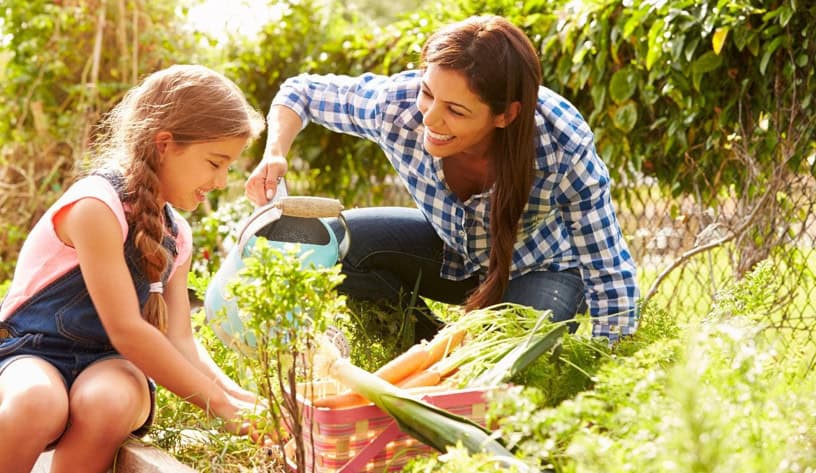
Have you noticed how strawberries aren’t as red and sweet as they used to be? Or that green beans aren’t quite as flavorful as they were when you were a kid? It’s not just your imagination. Mass-produced fruits and vegetables have lost much of their nutritional value in the past several decades.1
Ready to supercharge your body with supercharged vegetables and fruits from your garden? The first step is to supercharge your soil with compost.
Defining This Unique Process
Composting is the natural decomposition of leaves, grass clippings and other plant debris. Heat from the sun and moisture from rainfall “cook” the ingredients to help them break down with beneficial microorganisms aiding in the process. The resulting product is compost, laden with all kinds of yummy things for the soil and the plants growing in it. Compost is similar to the rich organic matter you’ll find on the woodland floor.
Plants use photosynthesis to make their own food. Gardeners can help that process by developing high quality soil for plants to grow in, and this is where compost plays a significant role.
Why Composting is So Important
Compost supercharges veggies and fruits by improving the soil with organic matter. The soil is the most important part of successful gardening, whether growing edible plants or ornamental plants.2
- Compost improves soil quality, structure, drainage, and oxygen, which enable healthy roots to develop and microorganisms to thrive, boosting plant health.
- If the soil is heavy clay, compost helps loosen it, making it easier for roots to take hold.
- If the soil is sandy, compost adds organic matter to stabilize plants’ roots and helps with moisture retention.
- Compost creates a soil environment that includes beneficial microorganisms, bacteria, and fungi, along with potassium, phosphorus, and nitrogen, three critical elements for plant health.
- Compost releases nutrients slowly, allowing plants and their roots to benefit long term.
Plants make their own food, in a process called photosynthesis, so developing a good soil base supports that process. A good soil produces tasty, supercharged fruits and vegetables with vitamins and other nutrients grown from healthy plants.
How to Achieve High-quality Compost
Along with the benefits of high-quality fruits and vegetables grown in your back yard, composting is an organic way to support your plants and your bodies. To ensure the compost is organic, avoid adding plant debris, such as grass clippings, that have been treated with synthetic commercial weed killers, insecticides, and other pesticides.
Food scraps can also be composted, but there are certain items you can and cannot compost.3 For example, eggshells are good, but cooked eggs should be avoided. Dead, dried plants are good, but if they’re diseased, they can spread that disease into the soil. Compostable paper towels or plates are good, but not if they’re covered in grease.
Besides feeling good about composting, the personal effort spreads way beyond your landscape. The main environmental benefit is keeping yard waste out of landfills.4
So, besides growing supercharged fruits and veggies, you’re helping your environment, personally and beyond the back yard.
NutriFusion
NutriFusion develops all‐natural fruit and vegetable powders that are nutrient dense for when you do not have access to fresh produce…and even when you do to improve your vitamin intake. Sourcing only whole, non-GMO foods, NutriFusion offers consumers a concentrated micronutrient and phytonutrient-rich food ingredient blends. With a farm-to-table philosophy, NutriFusion’s proprietary process stabilizes the nutrients from perishable fruits and vegetables, allowing a longer shelf life and access to vital nutrients.
NutriFusion fruit and/or vegetable powders are for use in foods, beverages, supplements, and pet foods. NutriFusion can help! Visit us at www.nutrifusion.com.
Author Bio
Jo Ellen Meyers Sharp was the founding editor of Indiana Living Green magazine and she frequently talks on the topic of how to live a green life. She is an award-winning garden writer, editor, and speaker. Known as a hortiholic, she frequently says her eyes are too big for her yard. She blogs at hoosiergardener.com.
——————————————————————————————————————————-
References
- How modern food can regain its nutrients. BBC website. https://www.bbc.com/future/bespoke/follow-the-food/why-modern-food-lost-its-nutrients/
- Tips for Successful Garden Planning and Planting. NutriFusion blog. https://nutrifusion.com/tips-for-successful-garden-planning-and-planting/
- What Can And Cannot Be Composted? Lawn Love website. https://lawnlove.com/blog/what-can-cannot-be-composted/ July 14, 2025.
- Composting at home. EPA website. https://www.epa.gov/recycle/composting-home



